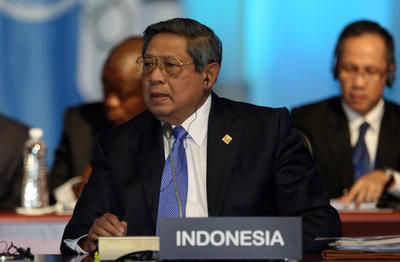It was strategic because it refrained from discussing issues, such as green growth and the G20 effort to contribute to the IMF’s ‘second line of defence’. Lastly, it was effective because its proposal for a global financing initiative on infrastructure facilities, and a framework to help develop the pipeline of bankable projects to boost infrastructure development in developing and emerging economies, experienced a degree of success. Indonesia’s determined effort to include its view on this matter in the final communiqué was included as part of the G20 Finance Ministers’ and Central Bank Governors’ agenda, and was well received by other developing countries, including India. Indonesia should be proud of this initiative.
Despite its focused, strategic and effective agenda, Indonesia’s agenda was not free from inconsistencies. First, it is ironic that a country that aims to be a champion of infrastructure investment spent less than 7.5 per cent of its national budget (less than 1.5 per cent of GDP) on infrastructure, while it spent about 17 per cent of its national budget on expenditure relating to energy subsidies. Instead of proposing to increase funds, Indonesia should perhaps have proposed that all emerging and developing countries in the G20 pledge to spend a certain percentage of their national budgets or GDP on infrastructure. This would help countries that do not spend enough to hold themselves to account.
Second, it is ironic that despite Indonesia’s G20 commitments, President Yudhoyono rejected the phasing out of fuel subsidies back in December 2011, maintaining that the subsidies help the poor. But, according to a 2011 World Bank study, the wealthiest 50 per cent of Indonesian households consume 84 per cent of subsidised gasoline, with the richest decile alone accounting for almost 40 per cent, and the poorest decile accounting for less than 1 per cent. The conclusion is clear: even though the fossil-fuel subsidy missed its target, the president has failed to increase the price of subsidised fuels.
Indonesia missed another valuable opportunity by failing to contribute to the IMF’s ‘second line of defence’. Many neighbouring countries, such as the Philippines and even Malaysia that rejected the IMF program during the Asian Financial Crisis of 1997–98 have made contributions to the fund, seeing this as an opportunity to speed up quota and voting reform. Indonesia should have participated by contributing a minimal amount, which could be counted as part of its international reserves and would therefore have no impact on the country’s balance of payments. Indonesia’s participation would have sent a strong signal to the world that it is time for Indonesia and other developing countries to play a more active role in IMF governance.
There are several possible explanations for Indonesia’s reluctance. The Indonesian G20 sherpa has said that Indonesia still wants to focus on assisting developing countries, rather than helping the ‘rich’ European countries. This reflects two issues: weariness of the G20 agenda being hijacked by European problems that Indonesia did not play any role in creating, and continued resentment based on how it was treated during the Asian Financial Crisis. The president might also have refrained from contributing based on domestic political sensitivity.
A contribution to the IMF’s second line of defence, a fund available to all IMF members, will help Indonesia transition from being a debtor country of the IMF, to a creditor country. It is also an opportunity for Indonesia to give back to the world after having received financial assistance in the past. In light of this, it is time for Indonesia to put the painful experiences of the Asian Financial Crisis behind.
Third, although Indonesia’s decision to join the Financial Inclusion Peer Learning Program with Chile and Mexico was praiseworthy, Indonesia’s National Strategy on Financial Inclusion is yet to be tested. Currently, only 49 per cent of Indonesia’s population has access to the formal banking sector, while 17 per cent of the population is excluded from the financial system altogether (both the formal and informal sectors, relating to banking and non-banking activities). This is a problem that disproportionately affects the poor.
In summary, although Indonesia’s approach to the G20 was laudable, it did not seem to be supported by sound and credible domestic policies. Further, even a small pledge to the IMF would go very far in selling the idea that Indonesia is no longer a debtor country to the IMF. Indonesia would also have been able to politically capitalise on the message that developing economies now have a greater say in governing the IMF. Indonesia’s participation at the G20 Summit opens the door for its people to participate in global affairs; but, because its participation does not translate into more sound and credible domestic policies at home, this door remains only half open.
Maria Monica Wihardja is a researcher at the Centre for Strategic and International Studies, Jakarta, and a lecturer at the Department of Economics, University of Indonesia. She is currently on leave to work as a consultant at Bank Indonesia. She is also Associate Editor at the EAF Indonesia desk.

